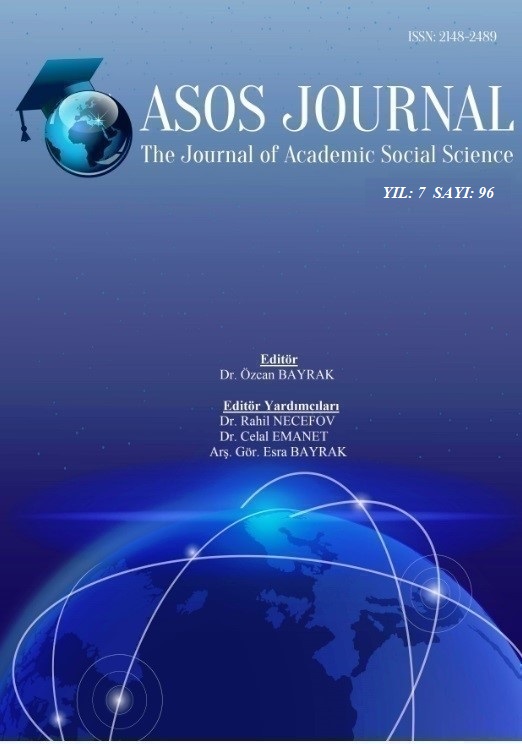Author :
Abstract
Müzisyenler performans sırasında genellikle stres, kas-iskelet fizyolojisi hastalıkları ve performans kaygısı ile ilgili sorunlar dile getirirler. Alexander Tekniği istenmeyen kas gerginliklerini azaltan, kronik boyun ve sırt ağrısına sebep olan gereksiz kas alışkanlıklarını engelleyen ve işe yaramayan hareket kalıplarını yeniden eğiten psiko-fiziksel bir yöntemdir. Bu makalede Alexander Tekniği’nin müzik öğrencileri ve müzisyenlerin müzik performansları üzerindeki etkisini araştıran çalışmalar değerlendirilmiştir. Ele edilen sonuçlara göre, Alexander Tekniği eğitimleri sayesinde müzik performansı kaygısı azaltılabilir. Alexander Tekniği’nin öğrencilerin ve müzisyenlerin müzik performansları ve performans kaygıları üzerindeki etkisini daha iyi incelemek için ileride daha kapsamlı kurgulanmış, Alexander Tekniği’nin deneyimli, profesyonel ve lisanslı çalışanlar tarafından birebir uygulandığı araştırmalar yapılmalıdır.
Keywords
Abstract
Musicians usually complain about stress, musculoskeletal disorders and performance anxiety during music performances. Alexander Technique is a psycho-physical method which releases unwanted muscle tension, inhibits unnecessary habitual behaviors causing chronic neck and back-pain, and re-educates non-beneficial movement patterns. This paper evaluated studies which applied Alexander Technique to investigate its effectiveness in music students and musicians during music performances. According to the results, it was observed that performance anxiety may be decreased through Alexander Technique sessions. In order to explore the effect of Alexander Technique on the music performances and performance anxieties of music students and musicians to a greater extent, well-designed future studies with one-to-one lessons from experienced, professional and licensed teachers are crucial for better results.
Keywords
- Ackermann B., Driscoll T., Kenny D. T. (2012). Musculoskeletal Pain and Injury in Profession- al Orchestral Musicians in Australia. Medical Problems of Performing Artists, 27/4, 181–187.
- Bosch A. J. (2005). The Use of the Alexander Technique in the Improvement of Flute Tone. Master’s Dissertation, University of Pretoria, Department of Music, South Africa.
- Brennan, R. (1996). The Alexander Technique Manual - A Step-By-Step Guide to Improve Breathing, Posture and Well-Being, Journey Editions.
- Burin, A. B. and Osorio, F. L. (2016). Interventions For Music Performance Anxiety: Results From a Systematic Literature Review. Archives Clinical Psychiatry, 43/5, 116-31.
- Doğan, M., and Çilden, Ş. (2017). Keman Dersine Yönelik Tutum Ölçeğinin Geliştirilmesi. Asos Journal Akademik Sosyal Araştırmalar Dergisi, 5/57, 362-375.
- Doyle G. (1984). The Task of the Violinist: Skill, Stress and the Alexander Technique. PhD Thesis, University of Lancaster, UK.
- Egner T, and Gruzelier J. H. (2003). Ecological Validity of Neurofeedback: Modulation of Slow Wave EEG Enhances Musical Performance. Neuroreport, 14/9, 1221–1224.
- Ergonomic Trends. (2019). 5 Alexander Technique Exercises You Must Try For Your Posture and Back Pain. http://ergonomictrends.com/alexander-technique-exercises-postureback-pain/ (ET: 19.07.2019)
- Guptill C.A. (2011). The Lived Experience of Professional Musicians With Playing-Related Injuries: A Phenomenological Inquiry. Medical Problems of Performing Artists, 26/2, 84–95.
- Hoberg A. (2008). Reducing Performance Anxiety in Woodwind Playing Through the Applica- tion of the Alexander Technique Principles. Master’s Thesis, University of Pretoria, Department of Music, Pretoria, South Africa.
- Josefsberg, M. (2018). 5 Alexander Technique Exercises. http://www.markjosefsberg.com/alexander-technique-exercises-2/ (ET: 19.07.2019)
- Klein, S. D., Bayard, C. and Wolf, U. (2014). The Alexander Technique and Musicians: A Sys- tematic Review of Controlled Trials. BMC Complementary and Alternative Medicine, 14, 414.
- Liebowitz, J. and Connington, B.. (2011). The Alexander Technique. Souvenir Press, https://books.google.com.tr/books?hl=tr&lr=&id=VyqGDwAAQBAJ&oi=fnd&pg=PT 10&dq=singing+and+alexander+technique&ots=9orV1XQy47&sig=QMJy0WW3Pb3O CwPUbtmexI36KbU&redir_esc=y#v=onepage&q=singing%20and%20alexander%20te chnique&f=false (ET: 19.07.2019)
- Little, P., Lewith, G., Webley, F., Evans, M., Beattie, A., Middleton, K., Barnett, J., Ballard, K., Oxford, F., Smith, P., Yardley, L., Hollinghurst, S., Sharp, D. (2008). Randomised Controlled Trial of Alexander Technique Lessons, Exercise, and Massage (ATEAM) For Chronic and Recurrent Back Pain. British Medical Journal, 337, a884.
- Mozeiko K. J. (2011). The Effects of Participation in the Alexander Technique on Female Vio- linists and Violists: a Mixed Methods Study. Dissertation, Boston University, College of Fine Arts, Boston.
- Nielsen M. (1988). A study of Stress Amongst Professional Musicians. In Proceedings of the Conference of the Alexander Technique: Medical and Physiological Aspects: 29 November 1987; Aalborg. Edited by Stevens C. Aalborg: Folk University, 14–16.
- Rachelle C. Wolf, Thurmer, H. P., Berg, W. P., Cook, H. E. and Smart, L. J. (2017). Effect of the Alexander Technique on Muscle Activation, Movement Kinematics, and Performance Qailty in Collegiate Violinists and Violists: A Pilot Feasibility Study. Medical Problems of Performing Artists, 32/2, 78.
- Schlinger M. (2006). Feldenkrais Method, Alexander Technique, and Yoga Body Awareness Therapy in the Performing Arts. Physical Medicine and Rehabilitation Clinics of North America, 17/4, 865–875.
- Valentine E.R., Fitzgerald D.F.P., Gorton T.L., Hudson J.A., and Symonds E.R.C. (1995). The Effect Of Lessons in the Alexander Technique On Music Performance In High and Low Stress Situations. Psychology of Music, 23/2, 129–141.
- Valentine E.R. and Williamon A. (2003). Alexander Technique and Music Performance: Evi- dence for Improved “Use” In Proceedings of the 5th Triennial ESCOM Conference: 8– 13 September 2003; Hanover. Edited by Kopiez R, Lehmann AC, Wolther I, Wolf C. Hanover: Hanover University of Music and Drama: 145–147.
- Woodman J.P., and Moore N.R. (2012). Evidence For the Effectiveness of Alexander Tech- nique Lessons in Medical and Health-Related Conditions: A Systematic Review”, International Journal of Clinical Practice, 66/1, 98–112.
- Zhukov, K. (2019). Current Approaches For Management of Music Performance Anxiety: An Introductory Overview”. Medical Problems of Performing Artists, 34/1, 53.





